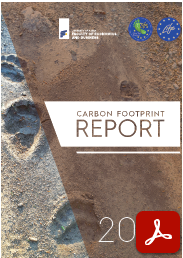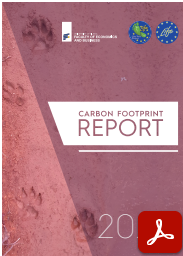ECO EFRI

The Faculty of Economics and Business, University of Rijeka has become the first higher education institution in Central and Eastern Europe to calculate its carbon footprint
In order to establish a harmonized approach to calculate the carbon footprint, the implementation of the three-year LIFE Clim'Foot project " Climate Governance: Implementing public policies to calculate and reduce organizations’ carbon footprint" was started in September 2015 in five European Union countries - France, Italy, Greece, Hungary and Croatia. The project is coordinated by the French Environment and Energy Management Agency (ADEME). The Croatian partner on the project is the Energy Institute Hrvoje Požar (EIHP). The Faculty of Economics and Business, University of Rijeka has been participating in this European LIFE Clim'Foot project since the very beginning.
Within the project, a national model for calculating organizations’ carbon footprint was developed and adapted to Croatian conditions. The model is based on the French Bilan Carbone tool, and is in line with the international standards and recommendations set by the European Commission. In order to design the model, a national base of greenhouse gas emission factors consisting of 172 national factors has been developed.
The national model for calculating the carbon footprint is currently tested on over 10 organizations including the Faculty of Economics in Rijeka. With EIHP’s help, the Faculty was the first to prepare the necessary data and calculate its direct and indirect greenhouse gas emissions from human activity, energy and materials for which the Faculty is responsible for or dependent on. The carbon footprint enables the Faculty of Economics to recognize the structure of its greenhouse gas emissions and develop potential reduction measures.
In addition to the calculation, the project also envisages the development of a strategy for carbon footprint management. The Strategy should encompass cost-effective measures aimed at maximizing the reduction of the organization’s carbon footprint per unit of invested financial resources which will ultimately lead to the greenhouse gas emissions reduction and climate change mitigation. The Faculty of Economics in Rijeka, together with EIHP will also participate in the drafting of the Strategy for Carbon Footprint Management.
For many years, the Faculty of Economics and Business in Rijeka has been developing and participating in programs and projects related to sustainable development, energy and ecology. Moreover, it is the founder of the only SEE interdisciplinary MBA study in Energy Economics, conducted in cooperation with the Energy Institute Hrvoje Požar. The heads of the LIFE Clim'Foot project team at the Faculty of Economics are prof. Saša Žiković, PhD and prof. Dejan Miljenović, PhD.













